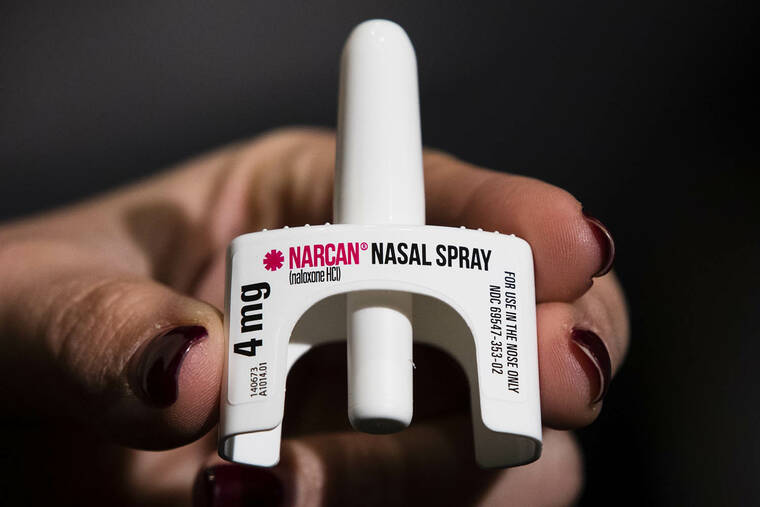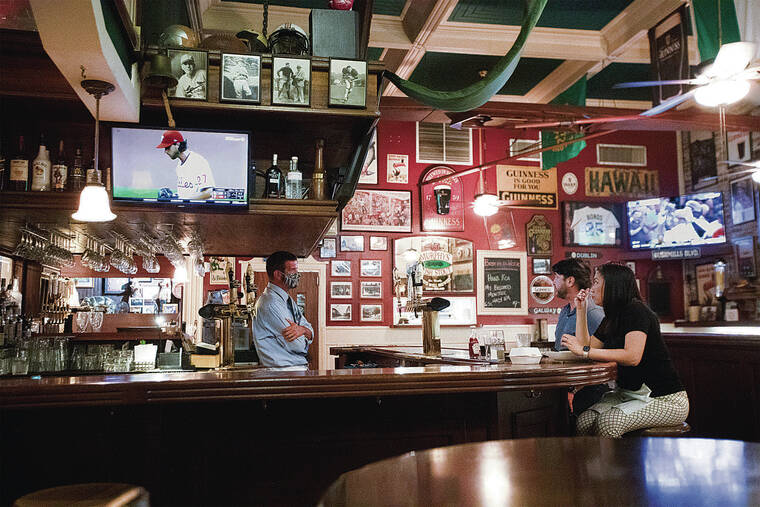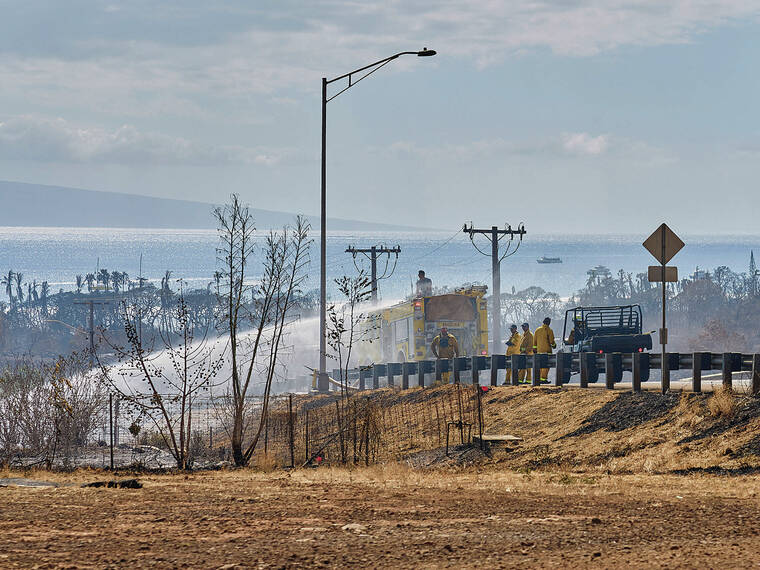Council mulls mandating Narcan in Honolulu bars, nightclubs

ASSOCIATED PRESS FILE
The Council’s consideration of Bill 28 coincides with the state Department of Health and its partnership with nonprofit Hawaii Health and Harm Reduction Center, or H3RC, to provide free doses of naloxone — known by its trade name Narcan — to all Hawaii residents.

GEORGE F. LEE / 2021
If passed, the proposed Honolulu ordinance to mandate bars, nightclubs and restaurants serving alcohol to have naloxone nasal spray on hand would take effect Jan. 1. Above, customers sit at the bar area at Murphy’s Bar & Grill in downtown Honolulu.


Under a new measure, Honolulu would mandate that roughly 850 bars, nightclubs and restaurants serving alcohol in the city be required to have naloxone nasal spray on hand to counteract opioid-related overdoses.
The City Council’s Committee on Housing, Sustainability and Health voted unanimously Wednesday to advance Bill 28 — introduced in March by Council member Tyler Dos Santos-Tam — for further committee study pending full Council review.
If passed, the proposed ordinance — deemed the first of its kind anywhere in the country — would take effect Jan. 1.
The Council’s consideration of Bill 28 coincides with the state Department of Health and its partnership with nonprofit Hawaii Health and Harm Reduction Center, or H3RC, to provide free doses of naloxone — known by its trade name Narcan — to all Hawaii residents.
According to Dos Santos- Tam’s office, the Department of Health agreed to provide two doses of Narcan to all liquor licensees in each of the counties in Hawaii. That action follows a state of Hawaii agreement made in July involving two national settlements totaling $26 billion. The settlements were reached as a result of investigations and litigation over pharmaceutical companies that allegedly fueled the nation’s opioid crisis.
In this case, 50 states including Hawaii signed on to the agreement involving three major drug distributors — Cardinal, AmerisourceBergen and McKesson — as well as drug manufacturer Johnson &Johnson.
Don't miss out on what's happening!
Stay in touch with breaking news, as it happens, conveniently in your email inbox. It's FREE!
As a result of the two settlements, the state of Hawaii netted $78 million. Of that amount, Oahu received 9.3%, or about $7.25 million — money now being used to fund free Narcan doses to Hawaii residents, Dos Santos- Tam’s office said.
“For reference, it would cost $27,003.48 to provide a dose of Narcan to all of the businesses affected by Bill 28,” Richmond Luzar, Dos Santos-Tam’s policy and communications director, told the Honolulu Star-Advertiser.
During Wednesday’s committee meeting, Dos Santos- Tam said the scourge of opioids — notably fentanyl — has cut across the country and affected Hawaii, too, with near-daily overdoses reportedly occurring on Oahu alone.
“And so we’re taking a proactive measure here to get ahead of this crisis with this bill that would mandate naloxone … in bars and restaurants — basically, places where alcohol is served on premises,” Dos Santos-Tam said, adding that opioid and alcohol consumption interacts with negative consequences. “We’d be the first jurisdiction in the country to mandate this. Many other cities have provided it for free to their bars and restaurants, and we’re hoping to do so here through the work of the Department of Health and the Liquor Commission as well as community partners like H3RC.”
Others at the meeting also supported Bill 28.
“As Council members pointed out, we do see overdoses on a daily basis, and fentanyl is on the rise on the mainland as well as other narcotics, so we are definitely in support of this,” said Honolulu Emergency Services Department Deputy Director Ian Santee.
During Council questions over locations on Oahu where opioid overdoses occur, Santee said he could say “with certainty that we have overdoses on the entire island.”
“And it doesn’t matter the area or location; it just matters that (people) get access to these drugs,” Santee said, noting overdoses occur in homes, at shopping malls and in bars and pubs. “It happens everywhere.”
He added departmental data shows EMS administers “over a thousand doses of Narcan annually” to counteract overdoses.
Anna Hirai, the Honolulu Liquor Commission’s assistant administrator, said the measure will conform to liquor laws and cover “all on-premise consumption licensees” excluding hotels.
Moreover, she said 1,471 licensees serve alcohol on Oahu, but Bill 28 would cover about 58% of those, or about 854 licensees.
Council Vice Chair Esther Kia‘aina asked city staffers whether affected businesses would have to pay for Narcan out of pocket.
“There’s an opportunity to get it for free,” Santee replied. “So I would encourage anybody to go and get it for free now, but I would have to defer to the Liquor Commission if they’d have to pay for it.”
No information was immediately given about possible future costs to affected businesses.
Although she recognized the need to prevent potentially fatal overdoses, Council member Val Okimoto remained concerned over mandates placed on certain businesses to stock Narcan rather than on other types of businesses.
In response, Santee said wherever Narcan is placed, it will make a difference.
Later, Okimoto also asked whether the Liquor Commission would be the prime enforcement agency of these mandates.
According to Hirai, under the language of Bill 28, her agency would be deemed the “secondary enforcement.” Hirai added that she assumed the Honolulu Police Department would be the primary enforcer of the proposed mandates.
“And is HPD aware of that?” Okimoto asked.
Hirai replied, “I don’t know.”
According to Santee, Narcan — basically administered as a nasal spray — is generally safe and is currently employed by the Honolulu Fire Department, EMS and HPD officers. He added even if Narcan is mistakenly given to an unconscious person who does not suffer from an opioid overdose, there are no dangerous side effects or health risks.
During public testimony, Heather Lusk, executive director of H3RC, said her organization was also in strong support of Bill 28.
“H3RC has been the primary agency that has distributed naloxone — over 50,000 doses — since (former) Gov. (David) Ige signed Act 68 in 2017, which does provide full immunity to anybody in the state who administers naloxone,” Lusk said. “It’s a very safe drug; if you have no opioids in your system, it cannot hurt you.”




